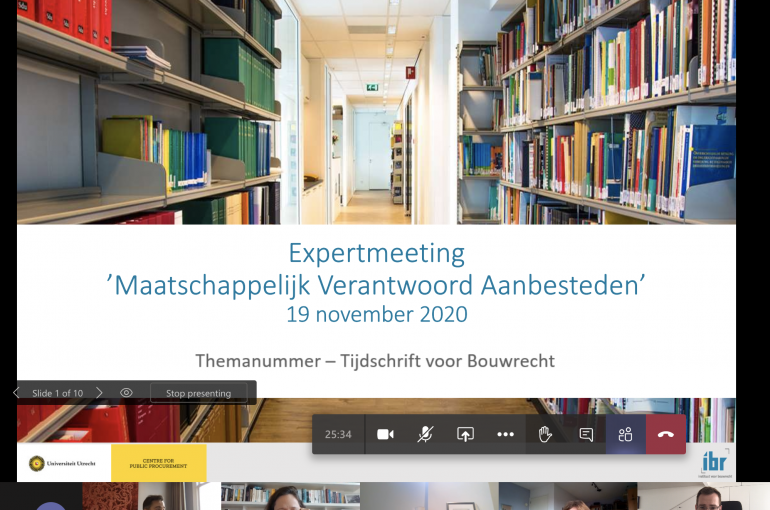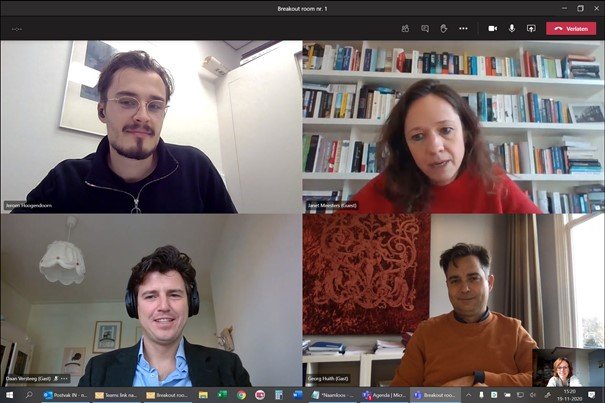Societally Reponsible Public Procurement: from possibilities to obligations? – UUCEPP – IBR Expertmeeting

In the last decade, public procurement has become increasingly important for the fight against climate change. The European Commission, the Member States, and contracting authorities recognize the potential of public procurement as an instrument to achieve sustainability objectives. Market parties are also prepared to contribute to a more sustainable world.
The role of European and Dutch public procurement law is also subjected to debate in this sustainability context. Discussions concern this scope of the current legal possibilities to integrate sustainability in public procurement, but also the question if this field of law should be more forceful by obliging contracting authorities to procure sustainable outcomes instead of leaving it to their discretion. The central question is if public procurement law is future-proof and still fit for purpose?
On 19 November, this subject was discussed during the Expertmeeting ‘Societally Reponsible Public Procurement: from possibilities to obligations?’ by experts from academia and practice. The discussions took place in two online break-out sessions (in Dutch):

From procedural requirements to instrumental public procurement law?
EU public procurement law contains – at first sight – various possibilities to include sustainability objectives in public procurement procedures. Still, question arise in terms of the scope of these possibilities and their suitability for practice. What legal or other obstacles still arise? What should be adjusted to further forster the role of public procurement, and what are the effects of the current efforts? What does this mean for the access of SME’s to these procedures?
The discussion in this session contained perspectives from Janet Meesters (DLA Piper), Daan Versteeg (Rozemond Advocaten), Georg Huith (Croon Advocaten), Natasja van Wijk (Instituut voor Bouwrecht) en Jeroen Hoogendoorn (Instituut voor Bouwrecht).
From possibilities to obligations to procure sustainable outcomes?
In addition to legal possibilities, more recent discussions have been sparked by a call for mandatory sustainable public procurement. This includes a critical analysis of current obligations, such as art. 1.4(2) Dutch Public Procurement Act, article 18(2) Directive 2014/24/EU and article 11 TFEU, but also a future perspective given the proposed sustainability objectives and minimum criteria in the EU Green Deal. A development from possibilities to obligations raises many questions. What are the legal and practical implications of this development? How can the courts deal with these obligations, and what does this mean for the position of economic operators? How should EU public procurement law develop itself: toward obligation or not? Or towards an optimal mix of possibilities and obligations?
The discussion in this session contained perspectives fromArthur van Heeswijck (Van Heeswijck Aanbestedingsadvocaat), mr. Joris Gruyters (KU Leuven), Lennard Michaux (KU Leuven), Eveline Neele (Centre for Public Procurement, Universiteit Utrecht), Jørgen den Houting (Rozemond Advocaten) en Willem Janssen (Centre for Public Procurement & Centre for Regulation & Enforcement in Europe, Universiteit Utrecht).
The expert meeting was organized by dr. Willem Janssen and Natasja van Wijk, and supported by the Centre for Public Procurement, the Centre for Regulation and Enforcement in Europe and the Institute for Construction Law.
The results of this expert meeting will be published in a special issue of the Dutch Journal for Construction Law (Tijdschrift voor Bouwrecht) for which the organizers will be the editors.
Tijdschrift voor Bouwrecht
De expertmeeting werd georganiseerd door mr. dr. Willem Janssen en mr. Natasja van Wijk, en ondersteund door het Centre for Public Procurement, het Centre for Regulation and Enforcement in Europe en het Instituut voor Bouwrecht.
De resultaten van deze expertmeeting worden gepubliceerd in een themanummer van het Tijdschrift voor Bouwrecht, waarvoor de organisatoren als editors zullen optreden.


